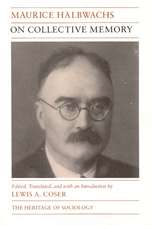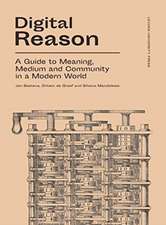The Politics of Regret: On Collective Memory and Historical Responsibility
Autor Jeffrey K. Olicken Limba Engleză Paperback – 20 iun 2007
Olick looks at how catastrophic, terrible pasts – Nazi Germany, apartheid South Africa – are remembered, but he is particularly concerned with the role that memory plays in social structures. Memory can foster any number of things – social solidarity, nostalgia, civil war – but it always depends on both the nature of the past and the cultures doing the remembering. Prior to his studies of individual episodes, he fully develops his theory of memory and society, working through Bergson, Halbwachs, Elias, Bakhtin, and Bourdieu.
| Toate formatele și edițiile | Preț | Express |
|---|---|---|
| Paperback (1) | 356.51 lei 6-8 săpt. | |
| Taylor & Francis – 20 iun 2007 | 356.51 lei 6-8 săpt. | |
| Hardback (1) | 820.40 lei 6-8 săpt. | |
| Taylor & Francis – 25 iun 2007 | 820.40 lei 6-8 săpt. |
Preț: 356.51 lei
Nou
Puncte Express: 535
Preț estimativ în valută:
68.23€ • 70.97$ • 56.33£
68.23€ • 70.97$ • 56.33£
Carte tipărită la comandă
Livrare economică 15-29 aprilie
Preluare comenzi: 021 569.72.76
Specificații
ISBN-13: 9780415956833
ISBN-10: 0415956838
Pagini: 238
Ilustrații: 3 black & white illustrations
Dimensiuni: 152 x 229 x 14 mm
Greutate: 0.44 kg
Ediția:1
Editura: Taylor & Francis
Colecția Routledge
Locul publicării:Oxford, United Kingdom
ISBN-10: 0415956838
Pagini: 238
Ilustrații: 3 black & white illustrations
Dimensiuni: 152 x 229 x 14 mm
Greutate: 0.44 kg
Ediția:1
Editura: Taylor & Francis
Colecția Routledge
Locul publicării:Oxford, United Kingdom
Cuprins
1. Introduction Part 1: The Sociology of Memory 2. Collective Memory: The Two Cultures 3. Collective Memory and Cultural Constraint: Holocaust Myth and Rationality in the Federal Republic of Germany 4. Genre Memories and Memory Genres: A Dialogical Analysis of May 8th, 1945 Commemorations in the Federal Republic of Germany 5. Figurations of Memory: A Process-Relational Approach Part 2: The Politics of Regret 6. The Politics of Regret: Analytical Frames 7. The Value of Regret: Lessons from and for Germany 8. Collective Memory and Chronic Differentiation: Historicity and the Public Sphere 9. From Theodicy to Ressentiment: Trauma and the Ages of Compensation
Notă biografică
Jeffrey K. Olick is Professor of Sociology and History at the University of Virginia. His previous books include "In the House of the Hangman: The Agonies of German Defeat, 1943-1949" (Chicago 2005) and "States of Memory: Continuities, Conflicts, and Transformations in National Retrospection" (Duke 2003).
Recenzii
"Olick's book is imaginative, thorough, and demanding: it sparkles with facts, ideas, concepts, and fascinating historical dynamics. The presentation is powerful and persuasive. While the books offers one of the most interesting and holistic presentations of collective memory, it goes well beyond it - to the complex meanings of modernity."
-- American Journal of Sociology, Vol. 114, No. 3
-- American Journal of Sociology, Vol. 114, No. 3
Descriere
Olick looks at a range of memory related issues, how catastrophic, terrible pasts – Nazi Germany, apartheid South Africa – are remembered, but he is particularly concerned with the role that memory plays in social structures.






















